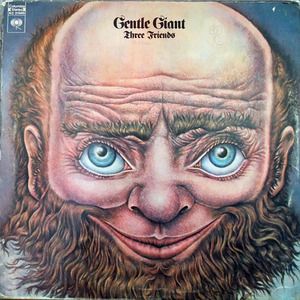
Album of the Day: Far East Family Band - Nipponjin (Vertigo DE | Late 1975) #progaotd #progrock #strawberrybricks
14.11.2025 12:47 — 👍 0 🔁 0 💬 0 📌 0@strawberrybricks.com.bsky.social
Author of The Strawberry Bricks Guide to Progressive Rock and webmaster of strawberrybricks.com. Follow me for the Progressive Rock Album of the Day #progaotd #progrock #progressiverock #strawberrybricks

Album of the Day: Far East Family Band - Nipponjin (Vertigo DE | Late 1975) #progaotd #progrock #strawberrybricks
14.11.2025 12:47 — 👍 0 🔁 0 💬 0 📌 0
Album of the Day: Gentle Giant - In A Glass House (WWA UK | December 1973) #progaotd #progrock #strawberrybricks
13.11.2025 10:14 — 👍 0 🔁 0 💬 0 📌 0
Album of the Day: Kraan - Wintrup (Spiegelei DE | June 1973) #progaotd #progrock #strawberrybricks
12.11.2025 10:38 — 👍 0 🔁 0 💬 0 📌 0
Album of the Day: Biglietto Per L'Inferno - Biglietto Per L'Inferno (Trident IT | Sometime 1974) #progaotd #progrock #strawberrybricks
11.11.2025 08:06 — 👍 1 🔁 0 💬 0 📌 0
Album of the Day: Gentle Giant - Gentle Giant (Vertigo UK | November 1970) #progaotd #progrock #strawberrybricks
10.11.2025 08:30 — 👍 1 🔁 0 💬 0 📌 0
Album of the Day: The Gods - Genesis (Columbia UK | November 1968) #progaotd #progrock #strawberrybricks
09.11.2025 08:53 — 👍 1 🔁 0 💬 0 📌 0
Album of the Day: Soft Machine - Land Of Cockayne (EMI UK | March 1981) #progaotd #progrock #strawberrybricks
08.11.2025 06:20 — 👍 1 🔁 0 💬 0 📌 0
Album of the Day: Gong - You (Virgin UK | October 1974) #progaotd #progrock #strawberrybricks
07.11.2025 06:44 — 👍 2 🔁 0 💬 0 📌 0
Album of the Day: Gentle Giant - Three Friends (Vertigo DE | April 1972) #progaotd #progrock #strawberrybricks
06.11.2025 04:11 — 👍 2 🔁 1 💬 0 📌 0
Album of the Day: Robert Wyatt - Robert Wyatt – Rock Bottom (Virgin US | July 1974) #progaotd #progrock #strawberrybricks
05.11.2025 04:35 — 👍 0 🔁 0 💬 0 📌 0
Album of the Day: Steve Winwood - Arc Of A Diver (Island US | December 1980) #progaotd #progrock #strawberrybricks
04.11.2025 02:03 — 👍 0 🔁 0 💬 0 📌 0
Album of the Day: Robert Wyatt - Robert Wyatt – Rock Bottom (Virgin US | July 1974) #progaotd #progrock #strawberrybricks
03.11.2025 02:27 — 👍 1 🔁 0 💬 0 📌 0
Album of the Day: Quiet Sun - Mainstream (Antilles US | August 1975) #progaotd #progrock #strawberrybricks
01.11.2025 23:54 — 👍 1 🔁 0 💬 0 📌 0
Album of the Day: Hawklords - 25 Years On (Charisma UK | October 1978) #progaotd #progrock #strawberrybricks
31.10.2025 21:21 — 👍 0 🔁 0 💬 0 📌 0
Album of the Day: Kingdom Come - Arthur Brown's Kingdom Come (Polydor UK | October 1972) #progaotd #progrock #strawberrybricks
30.10.2025 21:45 — 👍 0 🔁 0 💬 0 📌 0
Album of the Day: Peter Hammill - Nadir's Big Chance (Charisma UK | February 1975) #progaotd #progrock #strawberrybricks
29.10.2025 19:12 — 👍 5 🔁 0 💬 0 📌 0
Album of the Day: Van der Graaf - The Quiet Zone/The Pleasure Dome (Charisma UK | September 1977) #progaotd #progrock #strawberrybricks
28.10.2025 19:36 — 👍 1 🔁 1 💬 0 📌 0
Album of the Day: Kraan - Let It Out (Spiegelei DE | December 1975) #progaotd #progrock #strawberrybricks
27.10.2025 17:03 — 👍 0 🔁 0 💬 0 📌 0
Album of the Day: Magma - Live (Utopia FR | Fall 1975) #progaotd #progrock #strawberrybricks
26.10.2025 17:27 — 👍 0 🔁 0 💬 0 📌 0
Album of the Day: Group 1850 - Polyandri (Rubber Records NL | Sometime 1975) #progaotd #progrock #strawberrybricks
25.10.2025 17:52 — 👍 0 🔁 0 💬 0 📌 0
Album of the Day: Rush - 2112 (Mercury US | April 1976) #progaotd #progrock #strawberrybricks
24.10.2025 15:18 — 👍 1 🔁 0 💬 1 📌 0
Album of the Day: Cervello - Melos (Ricordi IT | September 1973) #progaotd #progrock #strawberrybricks
23.10.2025 15:43 — 👍 0 🔁 1 💬 0 📌 0
Album of the Day: Curved Air - Air Conditioning (Warner Bros. US | November 1970) #progaotd #progrock #strawberrybricks
22.10.2025 13:09 — 👍 0 🔁 0 💬 0 📌 0
Album of the Day: Procol Harum - Shine On Brightly (Regal Zonophone UK | September 1968) #progaotd #progrock #strawberrybricks
21.10.2025 13:33 — 👍 0 🔁 0 💬 0 📌 0
Album of the Day: Fairport Convention - Unhalfbricking (Island UK | July 1969) #progaotd #progrock #strawberrybricks
20.10.2025 11:00 — 👍 0 🔁 0 💬 0 📌 0
Album of the Day: Bruford - One Of A Kind (EG Records US | June 1979) #progaotd #progrock #strawberrybricks
19.10.2025 11:25 — 👍 1 🔁 0 💬 0 📌 0
Album of the Day: Novalis - Novalis (Brain DE | May 1975) #progaotd #progrock #strawberrybricks
18.10.2025 11:49 — 👍 0 🔁 0 💬 0 📌 0
Album of the Day: Strawbs - Hero And Heroine (A& US | February 1974) #progaotd #progrock #strawberrybricks
17.10.2025 09:15 — 👍 0 🔁 0 💬 0 📌 0